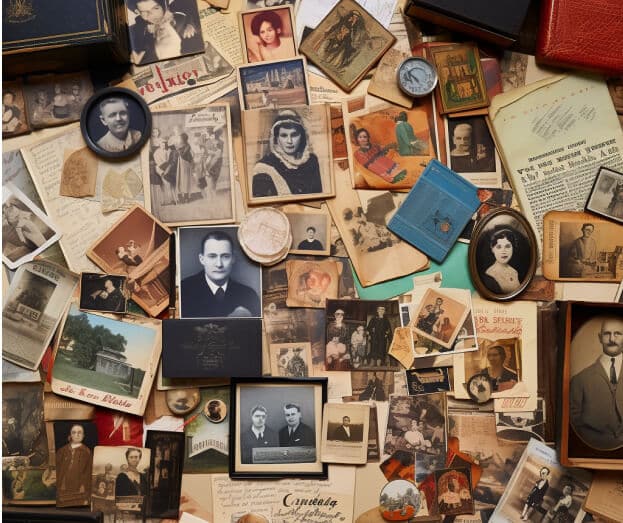Crafting a Life Story: Selecting Meaningful Events and Themes
January 3, 2025
Every life is a journey filled with triumphs, challenges, and defining moments. Each person has a unique story to tell, shaped by experiences, decisions, and the lessons learned along the way.
Whether you’re documenting your life for future generations or reflecting on it for personal growth, the process of writing your life story is deeply transformative.
But where do you start? With a lifetime of experiences to choose from, how do you decide which events deserve a place in your narrative? How do you craft a story that captivates your readers and keeps their attention?
In this blog, we’ll guide you through the process of choosing key events and themes to craft a life story that feels meaningful, purposeful, and relatable. Focusing on what truly matters will allow you to connect with your readers on a deeper level and inspire them along the way.
Why Themes Matter in a Life Story
Themes give your life story focus and direction.

They serve as the thread that ties events together, turning a series of moments into a coherent narrative.
By identifying central themes, you create a framework that highlights what is most important to you—your values, your lessons, and the person you’ve become.
What Are Themes in Storytelling?
In storytelling, themes are the core ideas or messages that drive the narrative. In a life story, themes could represent values like resilience, love, personal growth, or the power of family.
These themes add depth and meaning to your experiences, making your story more than just a collection of events.
How Themes Shape Your Story
Once you’ve identified your themes, they become the lens through which readers view your life.
Themes help you narrow down the events to include—focusing on those that best illustrate your central ideas.
For instance:
- A theme of resilience could highlight moments where you overcame adversity and emerged stronger.
- A theme of family might revolve around relationships, traditions, and the support (or challenges) your family provided.
By centering your story around these themes, you make your narrative more relatable and impactful.

Identifying Key Themes in Your Life
As Richard Branson says, “The best stories are not about how you became successful. They’re about how you overcame failure.”
Before you start weaving themes into your narrative, it’s important to first identify them. Self-reflection is crucial in uncovering the recurring themes that define your life. Here are some steps to help you pinpoint these themes:
- Reflect on Pivotal Moments
Think about the key events that have shaped you. These might include moments of adversity, significant accomplishments, or transformative relationships. Ask yourself: What did I learn from these moments? How did they shape who I am? - Create a Life Map
Organize your life experiences visually by creating a life map or timeline. Group your memories into categories like achievements, relationships, and turning points. Look for recurring patterns that reveal core themes. - Consider Your Core Values
Think about the values that have guided your decisions and actions. What principles have been most important to you? What legacy do you want to leave? Your themes will often align with these core values, whether it’s compassion, perseverance, or integrity. - Seek Input from Others
Sometimes, others can provide valuable insights. Ask someone close to you: What do you think defines my life story? What lessons have you learned from my experiences? Their perspective can help you identify themes you might have missed.
Once you’ve identified your themes, they’ll serve as the foundation for selecting events that align with them, helping you craft a narrative that feels focused and meaningful.
Selecting Meaningful Events
After identifying your themes, the next step is to choose the events that will illustrate them. Not every memory needs to make the cut.
Focus on those experiences that carry emotional weight, provide insight, or move the story forward. Here are some guidelines to help you make the right choices:

Criteria for Choosing Events:
- Alignment with Themes: Choose events that directly relate to the themes you’ve identified. For example, if resilience is a theme, highlight moments where you overcame challenges.
- Emotional Impact: Include moments that resonate emotionally, whether they make you laugh or cry. These moments will connect with readers on a deeper level.
- Relatability: Think about whether others can relate to the experiences, even if the specifics differ.
Types of Events to Include:
- Milestones: Major life achievements like graduations, career advancements, or personal victories.
- Transformative Moments: Times of personal growth or change, such as recovering from a setback or embracing a new perspective.
- Everyday Moments: Simple, yet meaningful moments that reveal character, relationships, or values.
Balancing Focus and Variety
A great life story needs to feel rich with experiences, but it’s essential to maintain focus. Resist the urge to include every single event.
Instead, concentrate on those that contribute to the central themes of your story. For example, if your theme is family, include a holiday story that highlights relationships, but leave out unrelated childhood anecdotes.
Balancing Personal and Universal Appeal
While your story is personal, it should also resonate with others. Readers connect with universal themes like love, resilience, and personal growth, so ensure that your personal details tie into larger truths.
An experienced autobiography writer knows how to balance specificity with relatability, allowing others to see themselves in your experiences.
The Power of Specific Details
Specific details bring your story to life. Instead of saying, “I had a happy childhood,” describe the sound of laughter around your family’s dinner table.
Instead of saying, “I was determined to succeed,” show a scene of you working late into the night.

Highlighting Universal Themes
Even though your story is uniquely yours, universal themes allow readers to see themselves in it. Frame personal moments in a way that speaks to shared human experiences.
Organizing Events into a Compelling Structure
Once you’ve chosen your events, the next task is organizing them into a cohesive structure. A strong narrative arc will keep your reader engaged from start to finish.
Popular Narrative Structures:
- Chronological Order: Follow your life’s events in a linear progression, ideal for stories of growth or transformation.
- Thematic Structure: Organize the narrative around key themes rather than a strict timeline. You might dedicate chapters to topics like resilience or love, grouping relevant events under each theme.
- Hybrid Approach: Combine both chronological and thematic elements to maintain a natural flow while emphasizing key themes.
Creating a Clear Beginning, Middle, and End
Ensure your story has a clear structure:
- Beginning: Introduce your background and central themes.
- Middle: Detail the challenges, triumphs, and key moments that shaped your life.
- End: Reflect on how you’ve changed and what you’ve learned.
Common Mistakes to Avoid
Writing a life story can be a rewarding experience, but there are common pitfalls to watch out for:

Overloading the Story with Too Many Details
Stick to events that move the narrative forward. Ask yourself: Does this event serve the story’s purpose?
Losing Focus on Themes
Use your themes as a roadmap to stay on track. Periodically check to ensure each section reinforces the central message.
Neglecting Reflection
Events without reflection can feel flat. After each significant moment, share what you learned and how it shaped you.
Overgeneralizing
Avoid vague statements. Specific, sensory details breathe life into your story.
Tools and Resources for Writing Your Life Story
Writing an autobiography can feel overwhelming, but with the right tools, it becomes manageable. Here are some helpful resources:
- Journaling Apps: Evernote, Day One, and Penzu can help you organize your thoughts and memories.
- Mind Mapping Software: Use tools like MindMeister or XMind to visually organize events and themes.
- Storytelling Guides: Books like Memoir Writing For Dummies and The Art of Memoir offer valuable insights.
- Online Courses: MasterClasses by renowned writers and memoir-focused courses on platforms like Udemy can deepen your storytelling skills.
Conclusion
Writing your life story is about more than just recording events—it’s about selecting the moments that define you and sharing them in a way that resonates with others. By identifying key themes, choosing impactful events, and weaving them together with purpose, you can create a narrative that both reflects your experiences and inspires others.
Your life story is a powerful gift to future generations and a chance to reflect on the lessons that shaped you. Take the time to craft it thoughtfully, and it will be a legacy that lasts. If you need help getting started, The Writers For Hire is here to assist—contact us today!






























